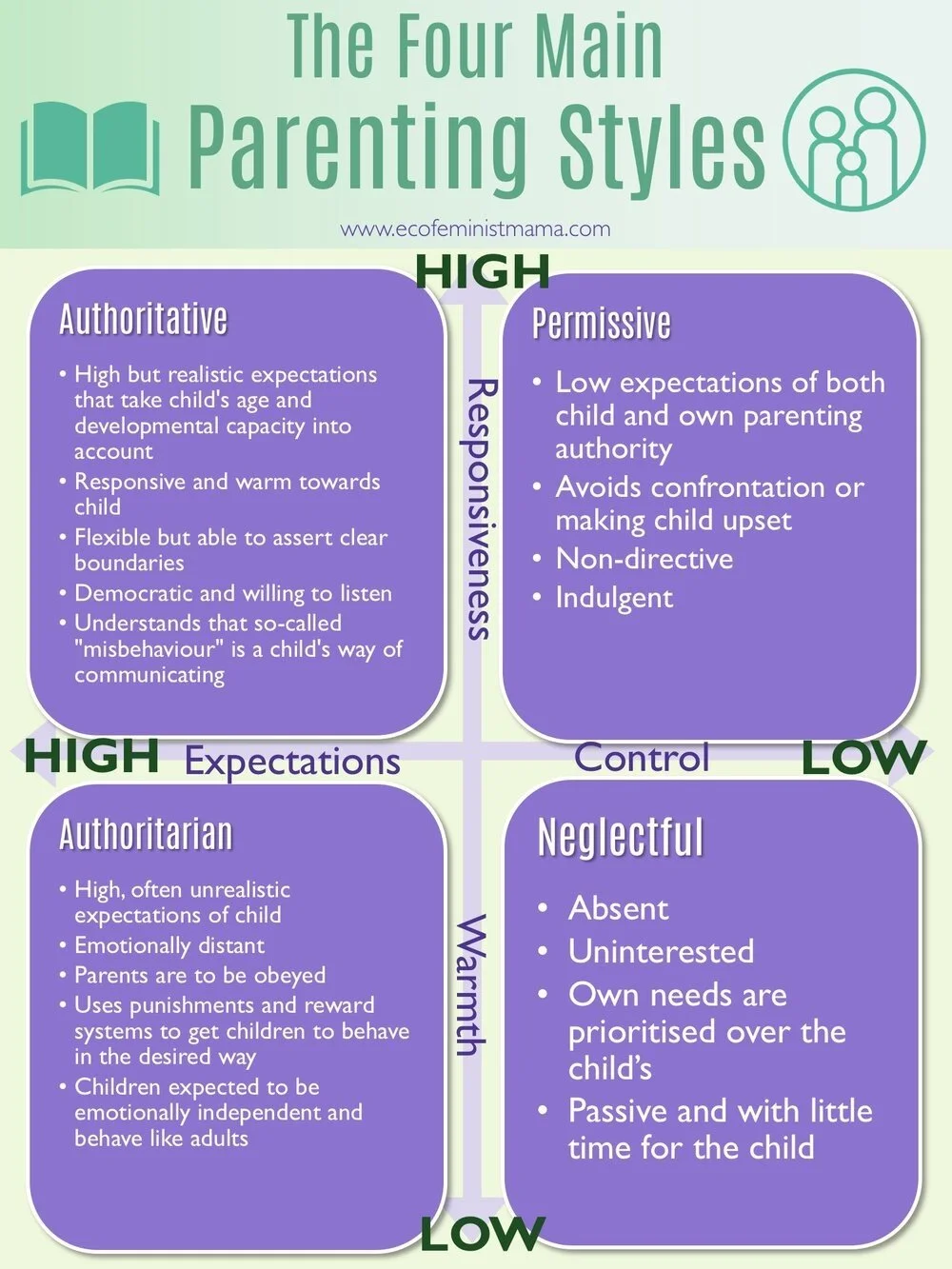Parenting Styles
Written by Crystal Yeager
Parenting is never an easy task, ask any parent. However, there are various parenting styles that promote wellness and understanding, which can help a parent with day to day situations with their child. Parenting styles vary, some more harsh than others and some more gentle than others. Not all children respond well to any specific parenting style. It is up to you to decide what parenting style works best for you and your child.
There are four main parenting styles; Authoritative, Permissive, Authoritarian, and Neglectful. The High Responsiveness parenting styles are the Authoritative and Permissive, which are the parenting styles in which the parent is highly reactive and involved with the child and decision making for the child. These parents are often referred to as “helicopter” parents or overprotective parents. However, there is a saying stating “over protective parents were under protected children.” Being over protective is not necessarily a bad parenting trait, and there is a lot of psychology that goes into why a parent feels the need to constantly monitor the behaviors and safety of their child, but that is a topic for another time.
The alternative parenting style, Low Responsiveness Parenting style, refers to parents that are less involved and are more passive when parenting. These parents are the type to let the child make their own choices and see the result or consequences to the child’s decision or actions. This also is neither good nor bad when it comes to parenting styles. These types of parents are the type to allow the child to be more free spirited and learn lessons through experiences. These parents also allow more autonomy for their child, which can also lead into less protection for the child.
Authoritarian Parenting
This is the parenting style arguably most prevalent in mainstream society. So-called “tiger parents” fall into this category. It has been passed down from generation to generation since Victorian and Edwardian times. It comes from a mindset of children needing harsh discipline in order to become respectable citizens.
High, often unrealistic expectations of child
Emotionally distant
Parents are to be obeyed
Uses punishments and reward systems to get children to behave in the desired way
Children expected to be emotionally independent and behave like adults
Authoritarian parents are low in warmth and responsiveness towards their children. They expect more independence and emotional and developmental capacity than their children are really capable of. In other words, authoritarian parents expect the same behaviors and understanding from children that they do from adults.
They are also big on punishment systems (and the counterpart, rewards systems) including things like time-out and the naughty step. At the most extreme end of authoritarian parenting lies physical punishment such as smacking or spanking.
Permissive Parenting
Unlike their authoritarian counterparts, parents who are permissive are generally very warm and responsive to their children. However, they have either inconsistent or non-existent boundaries. They regularly indulge the child’s wishes, usually out of fear of upsetting them.
Low expectations of both child and own parenting authority
Avoids confrontation or making child upset
Non-directive
Indulgent
These parents have few, if any boundaries with their children. The boundaries they do attempt to set quickly fall apart as soon as the child challenges them. “Yes darling, whatever if you want” is the mantra of the permissive parent.
Children of permissive parents grow up emotionally secure due to the warmth and emotional responsiveness they receive. However they can be impulsive, have a sense of entitlement, and become problematic when expected to conform to societal norms.
Neglectful Parenting
Neglectful parents are fairly self explanatory. They essentially leave their children to it and show little interest in participating in their children’s lives.
Absent
Uninterested
Own needs are prioritized over the child’s
Passive and with little time for the child
They show little to no warmth or responsiveness towards their child, neither do they attempt to instill boundaries or discipline. Often these parents experience difficulties such as mental health issues, financial stress, or alcohol or drug dependency.
Children with neglectful and disengaged parents generally experience a range of social, psychological, emotional and physical difficulties growing up. They are associated with some of the worst long-term outcomes.
Authoritative Parenting
This sounds similar but is not to be confused with authoritarian parenting. Authoritative parenting is seen by child development specialists as being the most successful approach. It is the one most likely to result in positive outcomes for both children and parents.
High but realistic expectations that take child’s age and developmental capacity into account
Responsive and warm towards child
Flexible but able to assert clear boundaries
Democratic and willing to listen
Understands that so-called “misbehavior” is a child’s way of communicating
Teaches children about the logical consequences of their behavior
Authoritative parenting is high in warmth and responsiveness, but also holds high expectations. Instead of having inappropriately high standards for the children, however, these are high expectations of the parent’s ability. Authoritative parents trust themselves to handle situations with confidence and authority, whilst having age-appropriate expectations of the child. The authoritative parent recognises which stage of development their child is at and adjusts their expectations accordingly.
In contrast to permissive parents, authoritative parents will consciously and consistently implement reasonable boundaries and age-appropriate discipline. They aim to help the child learn the logical consequences of their behavior and take responsibility for their actions.
The authoritative parent empathizes with how their child feels. They seek to help them overcome their developmental struggles while being good role models for the behavior they wish to see in their child” (Getz, 2020).
Parenting styles vary from person to person, and are also affected by the environment, how the parents themselves were raised, financial stability, and other stressful factors in the home. There is really no “correct” parenting style. However, if it is noted that a parent is being neglectful, intervention should be considered, for the safety and overall long term wellbeing of the child.
Reference:
